|
|
|
Sort Order |
|
|
|
Items / Page
|
|
|
|
|
|
|
| Srl | Item |
| 1 |
ID:
127015
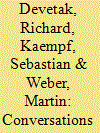

|
|
|
|
|
| Publication |
2013.
|
| Summary/Abstract |
This in-depth conversation with Professor Andrew Linklater engages with his academic biography, his intellectual contribution to the field of International Relations (IR) and his reflections on the current state of, and challenges facing, the discipline of (IR). It thereby traces his biography from his undergraduate days in Aberdeen, via his first lectureships in Australia, back to the United Kingdom and eventually to Aberystwyth University; it engages with his main oeuvres from the 1982 book Men and Citizens in the Theory of International Relations to his most recent work on The Problem of Harm in World Politics, and covers the development of IR as a global discipline from the 1970s until today.
|
|
|
|
|
|
|
|
|
|
|
|
|
|
|
|
| 2 |
ID:
171085
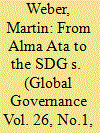

|
|
|
|
|
| Summary/Abstract |
The Alma Ata Declaration of 1978 proclaimed “health for all by the year 2000.” In 2019 health is mainstreamed through the United Nations’ 2030 Sustainable Development Goals (SDG s) initiative. Contributing to critical analysis of global health governance (GHG), this article reconstructs the normative premises of the Alma Ata Declaration, the political project it represented, and the successful cases it was inspired by. It contrasts this with an account of the emergence and gradual consolidation of the GHG agenda that is today reflected in the SDG s. The calls for a return to the Alma Ata Declaration resonate strongly among human rights advocates, community activists, and the medical profession. This is because of the socially exclusionary effects of the dominant health governance agenda shaped by distinctively neoliberal premises. The article argues that in the final analysis the two different approaches reflect very different ideas and ideals about “who global health governance is for.”
|
|
|
|
|
|
|
|
|
|
|
|
|
|
|
|
| 3 |
ID:
118025
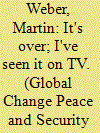

|
|
|
|
|
| Publication |
2013.
|
| Summary/Abstract |
Quick vignettes on the meaning of political events are an undertaking fraught with risks. Not least by facilitating overstatements, biases, and shortcuts, the latter both empirically and conceptually. What follows here should therefore be seen as nothing more than an offer of one way of framing an inquiry into the question of what the significance of the Occupy movement has been. It is emphatically not an attempt to cook the movement by way of reduction into an 'explanatory hotel-sauce' (taking Adorno's much loved phrase out of context here), to be poured retrospectively over events to make them analytically palatable. Rather than detracting from the diversity of experiences, modes of engagement, imaginaries, and resilience developed in very different sites and situations by people associating with, or inspired by, the 'Occupy' meme, I am simply trying to home in on one particular aspect, which, I think, may contain some hints about the continuities of the political concerns to which the 'events' side of Occupy gave voice, visibility, and exposure.
|
|
|
|
|
|
|
|
|
|
|
|
|
|
|
|
| 4 |
ID:
142539
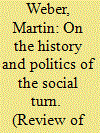

|
|
|
|
|
| Summary/Abstract |
The emergence of social theory is closely linked to the transformations inaugurated by the rise of a distinctly capitalist modernity from the second half of the eighteenth century onwards. In this article, I reconstruct the outlines of two strands of social theorising that emerged in response to the radical challenges posed by ‘the great transformation’ on the one hand, and the French Revolution on the other. I juxtapose two responses to the transnational constellations these events signify, one heralded by Auguste Comte, and the other, inter alia, by Karl Marx. While the Comtean frame obliterates meaningful registers of thinking about political transformation, I argue that conflict-theoretic tradition indebted to G. W. F. Hegel and Marx is much more amenable to analytical and practical concerns with responding politically to the challenges posed by ‘the rise of the social’. In the final part, this is discussed with reference to the ‘social turn’ in IR theory.
|
|
|
|
|
|
|
|
|
|
|
|
|
|
|
|
| 5 |
ID:
117843
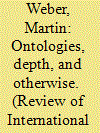

|
|
|
|
|
| Publication |
2012.
|
| Summary/Abstract |
This contribution investigates in some more depth a limited set of the premises on which Wight's argument for a 'scientific realist' approach to the study of International Relations (IR) rests, an approach, which, according to him, raises the hitherto unacknowledged centrality of ontological premises to all forms of knowledge and human action. Positing 'Politics as Ontology' (the book's subtitle) permits, so Wight's argument goes, the conduct of social science in a way which renders most epistemological and methodological disagreements obsolete, since the latter can be shown to be enabled only by competing, mutually exclusive, relatively incompatible, or unreflectively fragmentary ontological commitments. On this view, clarifying the respective ontological commitments, which underpin - tacitly or explicitly - competing theories yields the prospect of demonstrating relatively precisely what it is that enables disagreements at the levels of epistemology and methodology to arise in the first place. Programmatically, Wight seeks to establish the scientific realist account as a consistent, critical, fallibilist, unified account of scientific practice, reintegrating social and natural sciences in a reconceptualised naturalist scheme.
|
|
|
|
|
|
|
|
|
|
|
|
|
|
|
|
| 6 |
ID:
187535


|
|
|
|
|
| Summary/Abstract |
Ontological parochialism persists in International Relations (IR) scholarship among gestures towards relational ontological reinvention. Meanwhile, the inter-polity relations of many Indigenous peoples pre-date contemporary IR and tend to be substantively relational. This situation invites rethinking of IR's understandings of political order and inter-polity relations. We take up this task by laying out necessary methodological innovations to engage with Aboriginal Australia and then showing how conventional and much recent heterodox IR seek to create forms of ‘escape’ from lived political relations by asserting the powerful yet problematic social science mechanism of observer's distance. This demonstrates a need to take Aboriginal Australia as a system on its own terms to speak back to IR. We next explain how Aboriginal Australian people produce political order on the Australian continent through a ‘relational-ecological’ disposition that contrasts with IR's predominant ‘survivalist’ disposition. The accompanying capacity to manage survivalism through relationalism provides an avenue for engaging with and recasting some of mainstream IR's survivalist assumptions, including by considering an Aboriginal approach to multipolarity, without attempting ‘pure escape’ through alternative ontologies. We thus argue that while it is necessary to critique and recast dominant IR, doing so requires putting dominant IR and Indigenous understandings into relational exchange.
|
|
|
|
|
|
|
|
|
|
|
|
|
|
|
|
|
|
|
|
|